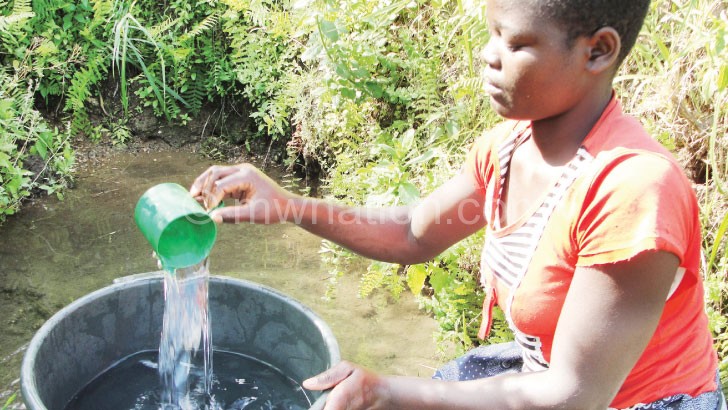Water for rural populations
There was joy when a drilling team arrived in Chokani Village, Chikwawa, on Friday. Women and girls will not have to travel long distances to collect potable water for cooking, washing and drinking. This will make water-borne diseases history, Shoreline Times reporter LIZ RUBIN writes.
It is 3am in Chikwawa and a young woman leaves her village on an exhaustive trek to procure water for her family.

This daily pursuit takes her on a nearly 10-kilometre roundtrip on foot to the few boreholes that store undependable, muddy rainwater used by the villagers to cook and bathe.
While Chokani Village, a remote setting in traditional authority Ngabu is almost 11 300km from the Connecticut shoreline, US, it’s close to the heart of Father Austin Phiri, a Catholic priest who serves as the chaplain at Yale New Haven Hospital Saint Raphael’s Campus and Connecticut Hospice in Branford.
Phiri grew up in Chokani Village and is the prime mover of a new organisation to assist farmers. His family lives there and he has first-hand knowledge.
He often talks about the dire need for water in his village with those who work with him.
“Water is life. Without water, there is nothing that can be sustained,” he says.
Phiri explains that boreholes are not always dependable because they rely on the rain. The rivers, which are deforested and silted, do not flow throughout the year—and they are shared by both people and animals.
“I think about it when I turn on the tap and get running water here in this blessed country of the United States of America. It pains me when my home people have no running water in their houses,” he says.
In 2015, Phiri began his work at the Connecticut Hospice and shared the struggles of his village with many of his colleagues who were greatly moved.
“Many people were interested in hearing about Malawi and really wanted to help,” he explains.
Last year, Phiri helped establish Malawi Farmers Inc in Connecticut to help bring water to Chokani Village.
The group plans to raise money to construct several deep-water wells in the dry season which begins this month.
“The first well will serve about 3 000 people. It needs to be constructed during the dry season to be sure that it’s deep enough. During the rainy season, the boreholes fill up quickly,” explains Phiri.
In addition to providing clean water for daily living in the village, wells will provide farmers with essential water to irrigate crops and hydrate animals.
With the help of Malawi Farmers, farmers can move from a subsistence level of farming to growing and harvesting for profit and greater economic stability, according to the priest.
Recently, Phiri visited Temple Beth Tikvah (TBT) in Madison, US, to share his story and the mission of Malawi Farmers.
Joining him was Madison resident Sam Powell, a volunteer at the Connecticut Hospice and board president of Malawi Farmers.
Together they led a workshop to provide the younger congregants of the temple a window into the struggle for potable water in Chokani Village.
“Hannah Jurewicz of the TBT Social Justice Committee designed this programme. It was to demonstrate and dramatise to the youth in our community the necessity for everyone to have clean water. We take that for granted in the United States, and we waste a lot of water. We turn on the tap, and out it flows,” says Powell.
During the workshop, Powell brought out 40 bags of salt pellets that weigh about as much as pails and jerry cans carried by women gathering water at the boreholes.
Many times women balance the cans on their heads while walking long distances.
“We had the kids drag the bags across the floor as if they were carrying water from a distant place and it was difficult for them,” Powell says. “Cups of water were given to the kids with coffee grinds in them to simulate contaminated water.
“The programme was designed at their level of understanding to convey the gravity of the situation even though it’s difficult for them to really, really grasp,” says Powell.
Afterwards, each child was given a full bottle of ice tea to take home and fill up with coins—they raised over $500 (K375 000).
With the dry season almost here, raising awareness and the necessary funds to construct wells in Chokani Village is critically important.
It is Phiri’s dream to bring water to farming families, a top priority for Malawi Farmers.
It is their mission: “No one should be denied the gift of clean water. This is a right for all humans.”





